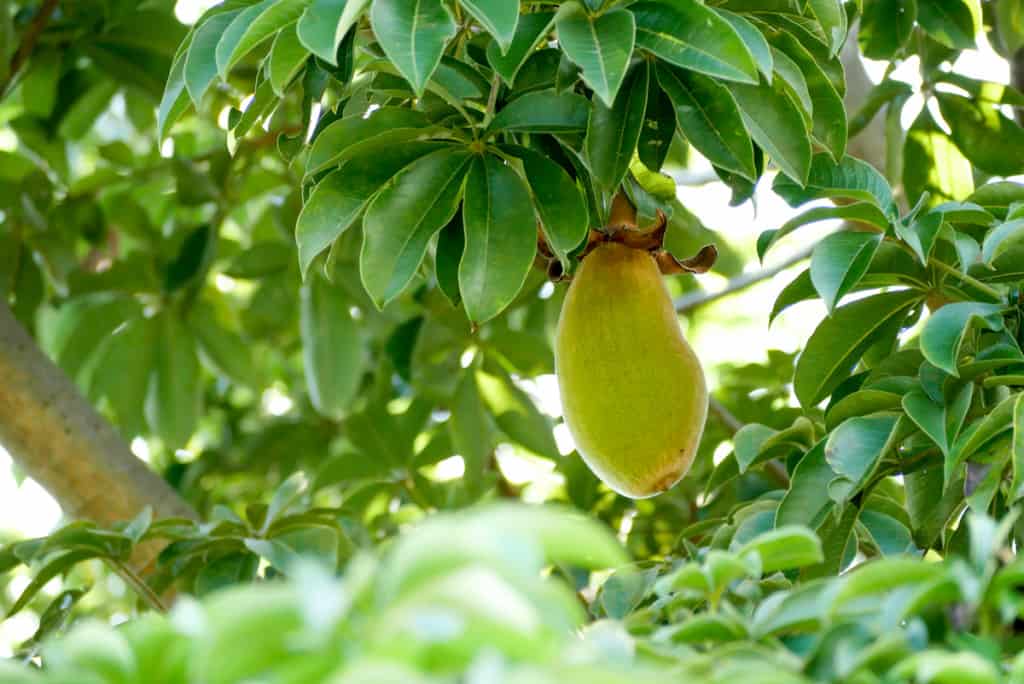Read time: 3.5 minutes
Interactive Content: Click tabs “What, Why, Where” to reveal more
BAOBAB BENEFITS
Native to Madagascar, mainland Africa, and Australia, and predating the separation of the continents this ancient giant tree has been an integral part of humanity since our beginning. The trunk stores water, the bark can made into textile, and the nutrient dense fruit offer health benefits similar to a multi-vitamin. It’s no wonder why it is called the “tree of life”.
Inside the super fruit
BAOBAB
Straight from the Source
Baobab
Baobab, or Adansonia digitata, is a large deciduous tree native to Madagascar, mainland Africa, and Australia. Known as the tree of life for its ability to provide food, water, and shelter in some of the most inhospitable environments on the planet.
History
The baobab tree is one of the oldest species of trees in the world, predating both mankind and the separation of the continents over 200 million years ago. It has been interwoven into many African religions and folklore, with some of the older and larger ones even being treated as a deity.
Due to their enormous size, hollowed out trunks, and ability to retain water, the baobab trees was used as important navigational markers for early European explorers. Chapman’s baobab, named after the South African explorer James Chapman who first wrote about the tree, was even used as a primitive post office in the 19th century.
Today Baobab still play an important role in many of Africa’s most rural communities, providing nutritious food, fiber for making household products, medicine, and with the increase in global demand direct income by selling the fruit to be made into products.
Harvest
Fruits are formed in the summer season and take six months to reach maturity. Only the fruit that naturally falls off the tree during the dry season is collected by hand before it is sent to be opened and have the pulp and seed separated. The fruit is naturally dried before being harvesting, so no additional drying step is needed so the pulp can be crushed and sieved directly after harvesting to obtain baobab powder.
Anatomy
When mature, baobabs have large hollow trunks that can reach 75 feet in diameter. Their crowns are made up of a few large branches with many appendages that when their deciduous leaves fall resemble a root system, giving it the name “upside-down tree”. Large, showy, and strongly scented Flowers are born near the tips of reproductive shoots and open rapidly near dusk to be pollinated by bats. The fruits are large, oval to round, with a tan gourd-like shell, and hold kidney-shaped seeds in a dry, pulpy matrix.
Etymology
Baobab gets its name from the Medieval Latin word bahobab, which was derived from the Arabic word abū ḥibāb, which means father of many seeds.
Baobab Benefits*
Baobab fruit is one stop shop for several bioavailable nutrients that have many health benefits. It has more vitamin C than an orange, more calcium than milk, more antioxidants than acai berries, more potassium than bananas, and it is full of prebiotic fiber.
Historical Uses
Baobab fruit, leaves, bark, roots, and seeds have been used to treat a wide variety of ailments, in fact there are over three hundred documented uses including neutralizing the effect of poisons, to help with the symptoms of malaria, and to kill Trypanosoma, the microbe that causes sleeping sickness.
Other Potential Health Benefits of Baobab *:
- Reduce inflammation in the body
- Balance blood sugar levels
- Promote healthy gut function
- Minimize damage caused by free radicals
- Support the immune system
Our Baobab Sources
Are sustainably harvested at
EcoProducts in Southern Africa. They are strongly rooted in conservation and social upliftment.
Baobab
Summary
What better ingredient to include in a vitality boost than the fruit from the “tree of life”. The fruit from this ancient African tree is one of the most nutrient dense foods on the planets with more Vitamin C than an orange, more calcium than milk, and more potassium than a banana it is nature’s multi-vitamin.
ASHWAGANDHA
Benenfits
Ashwagandha’s is full of withanolides, which are a group of naturally occurring steroids that have been shown to help lower Cortisol levels leading to a reduction in stress and anxiety.
Go to blogBLUEBERRY
Benenfits
Our Replenish & Recharge is loaded with this little blue superfood to help your body fight the damages caused by free radicals with high levels of antioxidants, particularly a group of flavonoids called anthocyanins.
Go to BlogCHAGA
Benenfits
Chaga’s Benefits derive from its high concentrations of antioxidants, Vitamin D, and Manganese, and it has been used to alleviate arthritis, increase the production of cytokines, and lower blood sugar.
Go to Blog